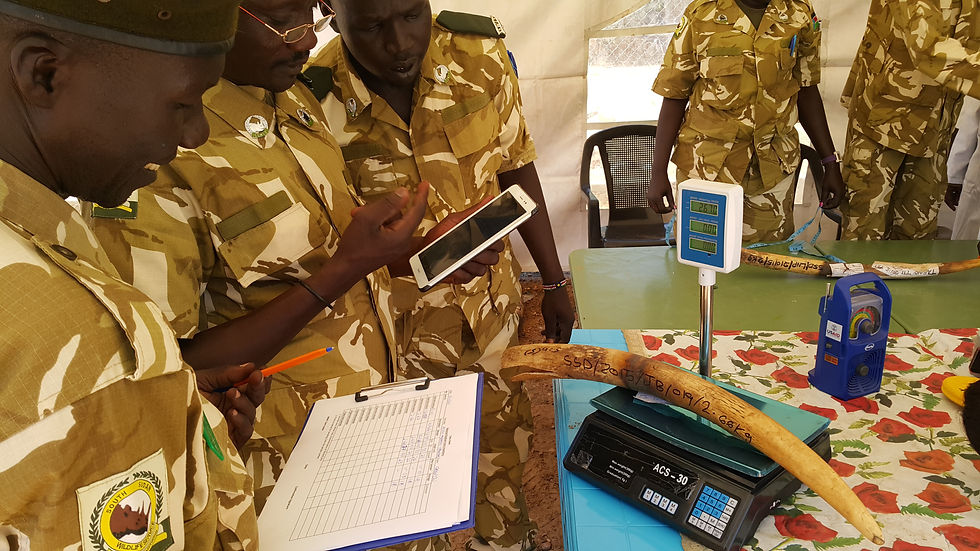Keeping Ivory out of Economic Use
- EPI Secretariat

- Aug 22, 2025
- 4 min read
In 2014 the EPI developed the Stockpile Management System (SMS), a digital protocol and inventory App. The SMS was launched in Ethiopia and today, 16 countries use it.

We have reinforced 46 wildlife product storerooms in 11 African countries. Since 2014, we have inventoried at least 446,000 kgs of ivory, and more than 1,000 wildlife officials have been through our training courses.
The SMS has been successful because it is simple and easy to use. It gives storeroom managers a digital inventory (not only of ivory but also other wildlife products such as pangolin scales, rhino horns and lion bones) and allows the head office to access the same data in real time, thereby improving management and
reporting in compliance with CITES recommendations. The SMS is typically used by national wildlife departments, but in Nigeria, for example, it is also used by the National Customs Service and a regional state government.

The EPI Foundation provides SMS equipment and initial training, but our ambition is that governments should become self-sufficient. Botswana and Kenya, countries with key elephant populations, are both encouraging examples of where the SMS is fully operational and where wildlife departments have not required further support after our initial training.

Kiprotich Biwott, Stockpile Management System Manager, cuts a piece of ivory for DNA Analysis, Nigeria, 2022
Over the past decade EPI countries have inventoried at least 446,000 kgs of ivory. This is more than half of all the ivory that is stockpiled in Africa which has been reported to CITES. (446,000kg of ivory is roughly equivalent to 95,500 elephants, based on the median complete tusk weight per country and total weight of ivory inventoried.)
Whilst conducting inventories, in countries including Angola, Kenya, Malawi, Nigeria, and South Sudan, we’ve trained wildlife departments on DNA sampling of ivory, and worked with forensic experts - including from the University of Washington and from TRACE - who can use these samples to gain insights into the origins of the ivory. We’ve also supported governments - Malawi, for example - to centralise their ivory
stockpiles in a single location, which allows for greater security and transparency. The EPI Foundation is now in discussion with countries outside Africa about the possible application of the SMS for their stockpiles of wildlife products.
The EPI Foundation has noticed a significant change in attitudes from government officials responsible for ivory stockpiles, following adoption of the SMS. Initially, we typically encounter uncertainty, a reluctance to communicate, and caginess. This is often because officials do not have systems in place. They lack the time and resources to access information and specific answers.
Today we work with officials who are confident in their management, frank about their capacity and forthcoming with exact figures. They understand what stocks they have and where. More countries can meet their CITES commitments and make annual reports on their stockpiles. Benin, for example, was one of five countries able to report its ivory stockpile to CITES for the first time in 2022 or 2023. South Sudan, which is not a CITES member, reports each year. Our work has been recognised and complemented during CITES plenary discussions. We have presented our tools at CITES events and regularly share expertise and advice with our partners.

The SMS is displayed on the CITES website. But we can still improve. We would like more countries to adopt the SMS, and we would like to expand its use to more government departments holding wildlife products, ensuring greater transparency and accountability from the moment items arrive in official custody.
SMS Case Study Benin

Colonel Rémi Hefoume, Director General of Water, Forests and Hunting in the Republic of Benin says “By joining the EPI in 2020, Benin has been able to establish a secure and transparent management system for its ivory and other wildlife products stockpiles. During the last four years the EPI, with donor support, has invested thousands of dollars, enabling us to develop and adopt standardised operational procedures, obtain appropriate equipment, establish secondary storage facilities, and implement the SMS. We now have a central storeroom which meets the EPI’s ‘Gold Standards’ requirements. The commitment of the EPI Foundation team, working with my colleagues, has been crucial. Benin now has a clear system to facilitate regular reporting to CITES. The EPI’s support began at our central storeroom, and successfully expanded to our two national parks.”
Training rangers in SMS, W National Park, Benin, 2023
“Benin is currently working with all the forest inspection units in the country to secure their stockpiles. We hope that in the coming months, with the support of the EPI Foundation, we will extend our work to the courts, the customs, and the police. We also hope to deepen cooperation with the EPI Foundation by working on human-elephant conflict and a National Elephant Action Plan.” Colonel Rémi Hefoume.














Comments